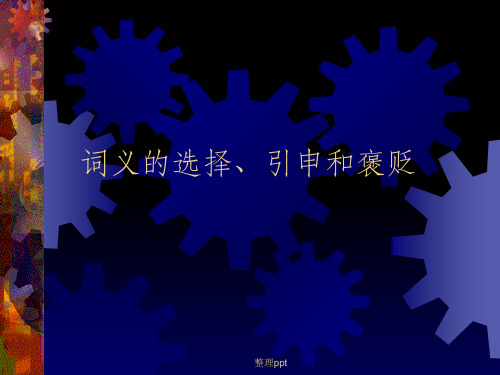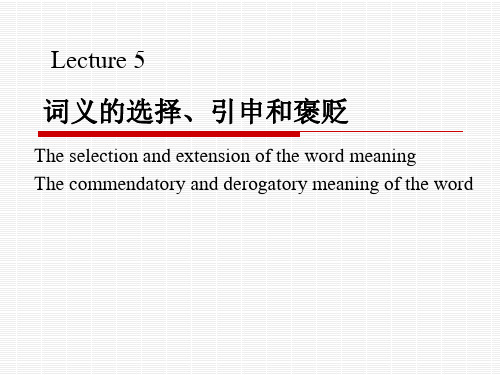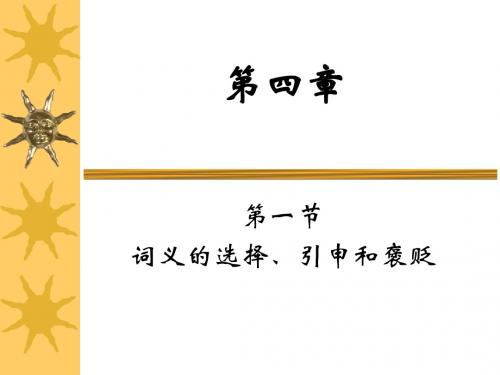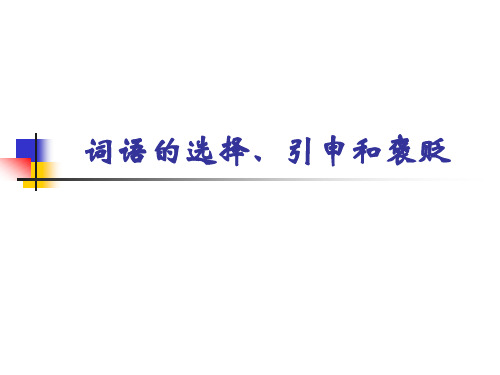词义的选择、引申和褒贬
词义的选择引申和褒贬

2、将带有特征性形象的词译 成该形象所代表的属性的词。
整理ppt
1) Rich and powerful, he always goosesteps on the street.
整理ppt
1) Goosestep的原义是从名词 “鹅步、正步” 转化而来的动 词,根据上下文引申,译成: “他有钱有势,在街上总是耀 武扬威,横行霸道。”
整理ppt
2)He is in critical condition, see-sawing between life and death.
整理ppt
2) See-saw原义是“跷跷 板”,这里引申译为:他的病 况危急,时好时坏,在生死之 间徘徊。
整理ppt
(二)具体化引申
整理ppt
语时一般作具体化引申。
整理ppt
2)He is a Shylock!
整理ppt
2) Shylock是莎士比亚笔下 的人物,其人刻薄歹毒,故该 句引申译为:他凶险狡诈。
整理ppt
Every life has its roses and thorns.
整理ppt
这里把玫瑰和刺引申,译为: “每个人的生活有苦有甜。”
整理ppt
整理ppt
2)他的学位成了他进入那家 公司获得高薪的敲门砖。
整理ppt
2. 英语中有些词在特定的上 下文中,含义是清楚的,但译 成汉语时还必须作具体化引申, 否则就不够清楚。
整理ppt
1) The car in front of me broke down and I missed the green.
整理ppt
She is a good Christian, a good parent, a good wife, a good daughter and a good teacher.
词义的确定、引申和褒贬

以challenge一词为例:
⑴ I challenge you to answer my question. 我要你回答我的问题。 ⑵ She challenged him for lying. 她指责他说谎。 ⑶ I now challenge Mr. Ford to deny that statement. 现在我要问福特先生敢不敢否认那篇讲话。 ⑷ I’ve constantly challenged my own conclusion. 我一直在重新考虑自己的结论。 ⑸ The United States Government does not challenge that position. 美国政府对这一立场不提出异议。
⑹His question challenged us to think. 他提出的问题促使我们去思考。 ⑺ The task challenged his organizing ability. 这项任务对他的组织能力是一个考验。 ⑻ The sentry challenged us. 哨兵问我们口令。 ⑼ Recent discoveries have challenged their old notion. 最近的发现使得他们原来的观念成了问题。 ⑽They challenge for the Davis Cup. 他们决心争夺戴维斯杯。 ⑾ It’s the challenge of our time. 这是我们时代的要求。 ⑿ Their success is a challenge to my effort. 他们的成就鞭策我做出努力。
词义的选择
英国语言学家Firth说: Each word when
used in a new context is a new word.
词义的选择、引申和褒贬1

(二) 根据搭配
Don’t pick up strange boys. 别和不认识的男 before six? 你能不能在6点以前来接我? She picked up a used camera at the flea market. 她在跳蚤市场买了一架旧照相机。
(二) 根据搭配
我可不吃这一套。
I won’t take all this lying down. 他要请我们吃馆子。
He is going to invite us out to dinner. 这种纸不吃墨水。
This kind of paper doesn’t absorb ink. 这件事你如果说出去,我叫你吃不了兜着走。
If you let this leak out, I’ll make you sorry for it. 只要技术好,到哪儿都吃得开。 A person who has expertise is welcome anywhere. 他在银行存款,吃利息。 He deposits money in the bank to get interests.
(四) 根据词性不同,词义不同
I want to present everyone present a present. 我想给在场的各位赠送一份礼物。 动词,赠送;形容词,在场的;名词,礼物 He was too close to the door to close it. 他离门太近以至于关不了门。 形容词,接近的;动词,关
It is wise to object to the unknown object. 拒绝不明物体是明智的。 动词,拒绝;名词,物体 Peter decided to desert his wife in the desert. 彼得决定把妻子抛弃在沙漠里。 动词,抛弃;名词。沙漠
词义的选择、引申、褒贬

词义引申(具体——抽象)
Grey hair should be respected(synecdoche) The pen is mightier than the sword. (metonymy) The invention of machinery had brought into the world a new era---the Industrial Age. Money had become King. (metonymy) 机器的发明使世界进入到一个新纪元即工业时 代,金钱成了主宰一切的权威。 He is a rolling stone. I don’t think he can go far. 他是个见异思迁的人,我想他不会有多大出息。
三、词义的褒贬
有些词义是中立的,本身不表示褒义或者贬义, 但在一定的上下文中可能有褒贬的意味. demanding He found that being a CEO was a demanding job. 他发现当首席执行官是个费力的工作。 As a demanding boss, he expected total loyalty and dedication from his employers. 他是个苛刻的老板,要求手下的人对他忠心耿 耿,鞠躬尽瘁。
小结(summary)
词义的选择: 根据词性来选择词义(word meaning) 根据上下文来选择词义(context) 根据搭配关系来选择词义(collocation)
二、词义的引申(extension)
引申的方法:抽象化引申 & 具体化引申 抽象化引申:具体——抽象 Do you think this dictionary of English is the supreme court in all matters concerning English words? 你认为这本英语词典是英语词汇的权威词典吗? See-sawing between partly good and faintly ominous, the news for the next four weeks was never distinct. 在那以后的四个星期内,消息时而部分有所好转,时而 又有点不妙,两种情况不断地交替出现,一直没有明朗 化。
week 7 第四章1词义的选择、引申和褒贬

轻音乐 轻微的损失 轻便的汽车 轻松的心情 轻快的脚步 轻浮的举止 轻巧的装备 轻松的工作 轻柔的声音
Reasons for using diction: Polysemy and different collocation
eat soup heavy rain
strong wind
black tea
第四章
第一节 词义的选择、引申和褒贬
一、词义的选译 Diction
By ―diction‖ we mean the proper
choice of words and phrases in
translation on the basis of accurate comprehension of the original.
brown sugar
strong tea prime time
喝汤 大雨 大风 红茶 红糖 浓茶 黄金时间
选择词义的要领
1. 根据词性选择词义
2. 根据上下文及逻辑关系选择词义 3. 根据搭配选择词义
1. 根据词性选择词义
Every penny I earned from the work was
词义的引申主要包括:
– 抽象化引申 – 具体化引申 – 典故的词义引申
2.1 抽象化引申
I was practically on my knees but he still
refused. 我几乎是苦苦哀求,但他依然拒绝。 The two sisters were usually in agreement on most issues, but they were at swords’ points on the matter of abortion. 在很多问题上姐妹俩的意见通常是一致的, 但在人工流产问题上,她们是有激烈争 执的。
笔译(词语的选择、引申和褒贬)

(二) 根据上下文联系以及句中的搭配关系 来选择和确定词义。 He is the last man to come. 他是最后来的。 He is the last man to do it. 他决不会干那件事。
He is the last person for such a job. 他最不配(最不适合)干这工作。 最不配(最不适合) He should be the last to blame. 怎么也不应该去怪他。 He is the last man to consult. 根本不宜找他商量。 This is the last place where I expected to meet you. 我怎么也没有料到会在这个地方见到你。
In the sunbeam passing through the window there are fine grains of dust shining like gold. (prep.) 在射入窗户的阳光里,细微的尘埃象金子一般在闪闪 发亮。 Like knows like. (n.) 英雄识英雄。
练习
1. It is not right for children to sit up late. The plane was right above our heads. In the negative, right and left, and black and white are reversed. She tried her best to right her husband from the charge of robbery.
4. No sooner was the avalanche of Christmas cards swept away the publishers began to fill the shops with their novel valentines. 5. The habit of sending gifts is dying out, which is disappointing for the manufacturers, who nevertheless still hopefully dish out presents for Valentine’s Day in an attempt to cash in.
词义选择与引申2
第四讲词义的选择、引申与褒贬词汇篇(1)词义的选择、引申与褒贬Focus:Ø 基于对源语文本的精确理解在目的语中选择恰当的词语和表达法Ø 词义的引申Ø 词义的感情色彩? 如何在翻译中选择精当的词语?Ø 注意一词多义现象,不能误用。
Ø 正确看待翻译时所使用的词典。
不能把词典当成选择词义的万能钥匙。
如果生硬地将词典的释义搬到译文中去,常易犯一些非常荒谬的错误。
翻译中,译者寻求的不只是词义的静态对应,而是词义交叉中的动态对应关系。
Ø 注意词义的灵活性(flexible),翻译中充分发挥自身的创造性。
? 一、根据词性来确定词义? 许多英语词汇往往有不同的词性,即分属于几种不同的词类。
翻译时首先要确定这个词在句子中属于哪一类词,然后再根据词类选择一个确切的词义。
? 例如:like作形容词时意思是“相同的”;作动词时意思是“喜欢、希望”;作介词时意思是“像……一样”;作名词时意思是“喜好、英雄”,如:Like knows like.(英雄识英雄)。
? 下面再以right为例加以说明:Ø Right,open your mouth,let me have a look.Ø 好,把嘴张开,让我来瞧瞧。
(感叹词)Ø He hoped to be absolutely right about this issue.Ø 他希望在这个问题上绝对正确无误。
(形容词)Ø I must answer that phone,but I‟ll be back right away.Ø 我得去接电话,马上就回来。
(副词)Ø The ship righted itself after the big wave had passed.Ø 大浪过后,船又平稳了。
(动词)Ø In England,we drive on the left side of the road,not the right side.Ø 在英国,车辆靠路的左侧行驶而不是靠右侧行驶。
第5讲 词义的选择、引申和褒贬
一、词义的选择
语境的定义(Malinowsky, 1923) 狭义:语言性语境指的是交际过程中某一话语结 构表达某种特定意义时所依赖的各种表现为言辞 的上下文,它既包括书面语中的上下文,也包括 口语中的前言后语; 广义:非语言性语境指的是交流过程中某一话语 结构表达某种特定意义时所依赖的各种主客观因 素,包括时间、地点、场合、话题、交际者的身 份、地位、心理背景、文化背景、交际目的、交 际方式、交际内容所涉及的对象以及各种与话语 结构同时出现的非语言符号(如姿势、手势)等。
A. 根据上下文中的词性确定词义 (round)
He was knocked out in the second round. 他在第二回合的比赛中被击倒。 n. 回合
The Earth turns round once in 24 hours. 地球二十四小时自转一圈。 adv. 绕圈子,围绕地
A. 根据上下文中的词性确定词义
(light)
The lake was bathed in the soft light of the moon. 湖水沐浴在柔和的月光下。 n. 光,光线,光亮
I lighted my sister up the stairs to bed with a candle. 我点着蜡烛带妹妹上楼去睡觉。 v. 点火,点燃
练习(根据搭配 make up)
It‘s time for you to make it up with your sister. You must make up what you owe before the end of the month. She made the material up into a dress. Farming and mining make up most of the country‘s industry. The chemist is making up the doctor‘s prescription. They made him up as an old man for the last act of the play. There isn‘t any girl called Clementine. He‘s just made her up.
词义选择、引申及褒贬
2012商务英语1班自主实践商务英语翻译竞赛——————词义选择、引申与褒贬12010401003厉雪12010401004付思宇目录第一部分容简介 (1)第二部分翻译技巧归纳及译例分析 (2)一、词义的选择 (2)二、词义的引申 (4)三、词义的褒贬 (8)第三部分小结 (10)第四部分句子翻译 (11)第五部分短篇翻译 (13)一、原文及译文 (13)二、解析 (14)第六部分参考文献 (16)第一部分容简介词语是翻译活动的基本单位,无论是句子、段落还是语篇,都是由单词构成的,因此,在翻译过程中,译者在弄清原句结构后,就要善于运用选择和确定原句中关键词词义的技巧,以使所译语句自然流畅,符合译文习惯说法。
翻译一定要把语言和环境、语言和表达、语言和情感结合起来,注意词义的选择、引申和褒贬这三方面的问题。
词义选择要求我们能够在繁多的词义中选出最符合语境的词义,选择词义时,我们可以从以下几个方面着手:1.根据词性确定词义2.根据场合与上下文确定词义 3.根据词的搭配关系确定词义。
词义引申就是根据上下文的在联系,通过句中词或词组乃至整句的字面意义由表及里,进行恰如其分的引申,运用一些符合汉语习惯的表现法,选用确切的汉语词句,将原文容的实质准确地表达出来。
词义引申可以归为四大类:分别是逻辑引申、语用引申、修辞性引申和概念围的调整。
其中逻辑引申又可以分为具象化引申和抽象化引申。
英语中存在大量具有浓烈感情色彩的词汇,翻译时需要我们根据具体语境做出相应的表达,这就是词的褒贬作用。
.有些词本身就有明确的褒义或贬义,汉译时做相应的表达; 某些英语词语汇集褒义和贬义于一身,汉译时要根据原句的上下文和语境来确定这些词汇的褒贬意义;有些词义是中立的,本身不表示褒义或者贬义,但在一定的上下文中可能有褒贬的意味.下面我们将就每一项进行详尽的解释。
第二部分翻译技巧归纳及译例分析一、词义的选择英汉两种语言都有一词多类、一词多义的现象。
词义的选择、引申和褒贬
The ship righted itself after the big wave had passed. (v.) 大浪过后,船又平稳了。 In England,we drive on the left side of the road,not the right side.(adj.) 在英国,车辆靠路的左侧行驶而不是靠右 侧行驶。 He exercised his legal right as President to halt the investigation.(n.) 他行使了总统的法定权力去阻止这场调查。
2.1. 词义的引申
一.
2.1.1词义的具体化
具体化是指在译文中,用所指意义较窄的词或词 组替换原文中所指意义较广的词或词组。如: 1. The Great Wall is a must for most foreign visitors to Beijing. 长城是任何一个外国游客必不可少的参观游览项 目。 2. Two years’ working is a must to the people who want to take up graduated examination. 对于参加研究生考试的人来说,两年的工龄是必 备条件。
ad 使死者回生 raise a fleet 集结一支舰队 raise a monument 树一座丰碑 raise an embargo 解除禁运
1.3 根据语境确定词义
1.3.1 . 上下文(verbal context) 1. We hope Mr. White will not forget himself, gone are the days when a representative of a large country in UN. may do whatever he likes.
- 1、下载文档前请自行甄别文档内容的完整性,平台不提供额外的编辑、内容补充、找答案等附加服务。
- 2、"仅部分预览"的文档,不可在线预览部分如存在完整性等问题,可反馈申请退款(可完整预览的文档不适用该条件!)。
- 3、如文档侵犯您的权益,请联系客服反馈,我们会尽快为您处理(人工客服工作时间:9:00-18:30)。
词义的选择、引申和褒贬
一、词义的选择
英汉两种语言都有一词多类、一词多义的现象。
在英汉翻译过程中,我们弄清原句结构后就要善于选择和确定剧中关键词的词义。
选择和确定词义通常从以下两个方面着手:
(一)根据词在句中的词类来选择和确定词义
给出下列练习
1.It is not right for children to sit up late.
2.The plane was right above our heads.
3.In the negative, right and left, and black and white are reversed.
4.She tried her best to right her husband from the charge of robbery.
(二) 根据上下文联系以及词汇在句中的搭配关系来选择和确定词义
给出下列练习
Account for
1.He is ill; that accounts for his absence.
2.In this battle he accounted for the five of the enemy
3.I want you to account for every cent you spent.
Make up
1.If the stove is not made up, it will go out.
2.There is not any girl called Clementine. He is just made her up.
3.Half the roads in the region are still to be made up.
4.Society is made up of people with widely differing abilities.
5.It took Laurence Oliver more than an hour to make up for the part of “Othello”
6.They made up a bed on the sofa for the unexpected visitor.
7.We have to drive fast to make up the hour we lost in Boston.
Figure
1.The foreign trade ha risen to unprecedented figures
2.Dr. Eliot was one of the most revered figures in the world of learning.
3.On the desk, there was a bronze figure of Plato.
4.He saw dim figures moving towards him.
5.June was good at figure skating.
二、词义的引申
英译汉时,有时会遇到某些词在英语词典上找不到适当的词义,如任意硬套或逐个死译,会是译文生硬晦涩,不能确切表达意愿,甚至造成误解。
这是就应根据上下文和逻辑关系,从该词的根本含义出发,进一步加以引申,选择比较恰当的汉语来表达。
(一)将词义作抽象化的引申
1.将表示具体形象的词译成改形象所代表的属性的词
There is a mixture of the tiger and the ape in the character of the imperialists.
帝国主义者的性格既残暴,又狡猾。
这里把tiger和ape这两个具体形象引申为这两个形象所代表的属性:残暴和狡猾
2.将带有特征的形象的词译成改形象所代表的概念的词
See-sawing between partly good and faintly ominous, the news for the next four weeks was never
distinct.
在那以后的四个星期内,消息时而有部分有所好转,时而又有点儿不妙,两种情况不断地交替出现,一直没有明朗化。
See-sawing 是从see-saw(跷跷板)转化而来的动词,本作“玩跷跷板”,这里根据上下文引申为“两种情况不断地交替出现”
(二)将词义作具体化的引申
1.英语中也有用代表抽象概念或属性的词语表示一种具体事物,译成汉语时一般可以作具体化引申
Vietnam was his entrée to the new Administration, his third incarnation as a foreign policy consultant.
越南战争成了他进入新政府的敲门砖。
他担任政府的对外策略顾问,那是第三次了。
2.英语中有些词在特定的上下文中,其含义是清楚的,但译成汉语时必须作具体化的引申,否则就不够清楚。
Jewish-owned shops were shut down,Swastikas replaced six-pointed stars.The walls of anti-Semitism were closing in.
犹太人的铺子关闭了。
米字旗取代了六角星旗。
反犹太主义的包围一天紧似一天。
三、词义的褒贬
(一)英语中有些词本身就有褒贬意义,汉译时就要相应地表达出来。
He is a man of high renown.
他是位有名望的人。
His notoriety as a rake did not come until his death.
他流氓的恶名是死后才传开的。
(二)英语中有些词义是中立的,本身不表示褒义或贬义,但在一定的上下文中可能有褒贬的意思。
汉译时就应该用具有褒贬意思的词来表达。
给出如下练习
.1. It was mid-August and the subject for discussion was the future of Rommel and his Africa Corps.
2.They predicted the youth would have a bright future.
3.John was an aggressive salesman who did his job quite well.
4.Hitler pursued an aggressive policy after he seized power.
5.Hans was too obviously flattering the gentleman by saying he was the most courageous man
he had ever seen.
6.Mr. Brown felt greatly flattered when he received the invitation to deliver a lecture.
练习答案
孩子们昨晚睡得不好
飞机正好在我们头上面
照片底片上,左右黑白与正片恰好相反
她尽力为她丈夫被控抢劫伸冤
他生病了,这就是他缺席的原因
他在这场战斗中消灭了五个敌人
我要你把花费的没分钱都交代清楚
如不添煤,炉子就会熄灭
根本没有一个叫克莱门蒂的姑娘,全是他捏造出来的
这地区的路面有一半还没有修好
社会是由具有迥然不同的能力的人组成的
扮演奥赛罗这个角色,劳伦斯奥利维花了一个多小时化妆
他们把沙发收拾一下让这位不速之客睡
我们不得不加快车速,以弥补在波士顿所耽误的时间
对外贸易的数字有了空前的增长
埃利奥特博士是学术界最受人尊敬的人物之一
书桌上有一尊柏拉图的铜像
他隐隐约约看见一些人影在向他跟前移动
琼善于花式溜冰
当时是八月中旬,他们讨论的题目是隆美尔及其非洲军团的下场
他们预言,这个年轻人会有一个锦绣前程
约翰是个积极肯干的推销员,他工作干得很出色
希特勒夺取了政权之后就推行侵略政策
汉斯说,这位先生是他所见过的最有胆识的人,这种阿谀奉承未免过于露骨布朗先生接到做演讲的邀请时感到非常荣幸。
